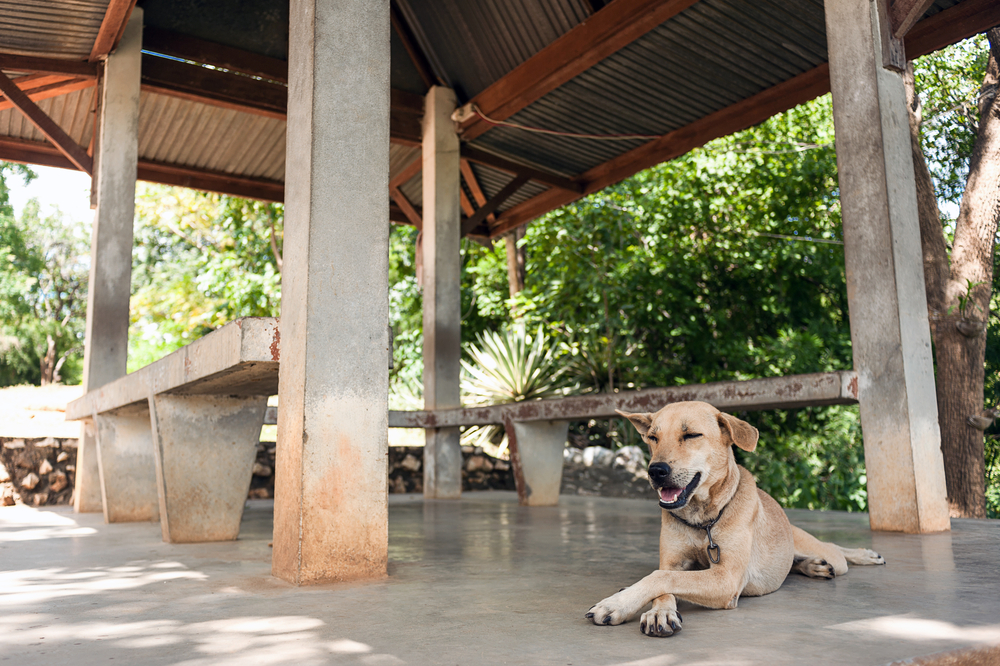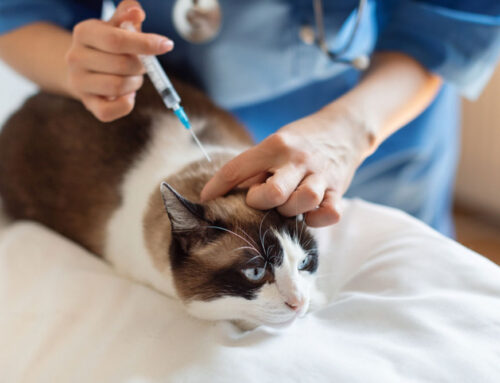July Fourth is a great time to gather with friends and family, but these events can pose dangers to your pet. The veterinarians in south Austin at Oliver Animal Hospital want to help by offering tips to protect your pet during the festivities.
#1: Create a safe zone for your pet
Large crowds can be stressful for pets, and your pet will need a place where they can escape if they become overwhelmed. In addition, if your pet is typically shy around guests, you might consider confining them to a quiet area in your home to keep their stress levels low. A good pet safe zone should include:
- A nice place to rest — Place your pet’s bedding in the area so they will be comfortable. You also can place your recently worn clothing on their bed to help make the space more familiar.
- White noise — Use white noise or music to help drown out the sounds from the party to lessen your pet’s anxiety.
- Toys — Ensure your pet has toys to keep them distracted. Offering your pet a food puzzle toy before your guests arrive is a great way to ensure they are occupied during the party.
- Supplies — Ensure your pet has clean water in their safe space and provide a litter box for your cat. You also should take your dog outside for a potty break before confining them.
#2: Identify your pet
Pets can easily get lost during the commotion caused by a party, and properly identifying them can help you find them if they go missing. Microchipping your pet is an easy procedure that provides permanent identification that can’t be lost or removed. In addition, your pet should wear a collar and tags that have your current contact information so they can be identified when found.
#3: Refrain from sharing party food with your pet
Many foods served at July Fourth celebrations are high in fat and can cause gastrointestinal upset in pets or lead to pancreatitis, a painful and potentially life-threatening condition. In addition, many common human foods are toxic to pets. These include:
- Onions — Onions, garlic, chives, shallots, and leeks contain N-propyl sulfide, which causes oxidative damage to a pet’s red blood cells, resulting in anemia. Initial signs include vomiting and weakness, but as the condition progresses, signs can include pale gums, reddish urine, and fainting.
- Grapes — Grapes and raisins contain an unknown toxin that causes kidney failure in pets.
- Chocolate — Chocolate contains caffeine and theobromine, which cause central nervous system stimulation in pets. Signs include vomiting, diarrhea, restlessness, panting, and excessive urination.
- Alcohol — Pets are extremely sensitive to alcohol, and ingesting a small amount can cause problems. Signs include lethargy, lack of coordination, vomiting, and collapse.
Tell your guests not to feed your pet, and watch for discarded plates so you can put them in the trash before your pet finds them. If your pet ingests a toxic substance, immediately contact Oliver Animal Hospital or Animal Poison Control to get professional advice on how to proceed.
#4: Ensure your pet stays out of the trash
When scavenging for treats in the trash, your pet can ingest a foreign substance such as bones or plastic wrap. These objects can cause a gastrointestinal obstruction, requiring surgery to remove. Keep your garbage in sealed containers to ensure your pet is safe.
#5: Manage your pet’s noise aversion
Many pets are terrified of fireworks. This condition is called noise aversion and is similar to a panic attack in humans. The experience can be extremely upsetting for your pet, and they may injure themselves when trying to escape from the noise. You can desensitize and counter-condition your pet to lessen the effect fireworks have on them, but these techniques take time and should be started well before the July holiday. These steps include:
- Find a recording — Find an appropriate fireworks recording online, and play the track for your pet to ensure they react as expected.
- Keep the volume low — Play the recording at a low enough volume that your pet doesn’t react.
- Make the experience enjoyable — Feed your pet or play a favorite game with them while the recording plays at the low level.
- Gradually increase the volume — Over several sessions, gradually increase the recording’s volume to desensitize your pet to the noise. If they become fearful, reduce the volume until they are calm, and start the next session at this volume.
#6: Ensure your pet doesn’t overheat

Pets don’t sweat like humans do, and they have to use other, less efficient, means to cool themselves. This makes them more susceptible to heatstroke, a serious and potentially life-threatening condition. Watch your pet closely for signs indicating overheating, such as excessive panting, drooling, difficulty breathing, weakness, and diarrhea. If your pet gets overheated, take the following steps:
- Move to a cool area — Move your pet to a cool, well-ventilated area.
- Take their temperature — Use a rectal thermometer to assess your pet’s temperature. Normal temperature for a pet is 100 to 102.5 degrees.
- Use wet towels — Cover your pet in lukewarm towels. Never use cold water or ice because this can lead to shock.
- Get your pet to the veterinarian — Your pet will need veterinary care as soon as possible.
Follow these tips to ensure your pet stays safe this July Fourth. If you would like to have your pet microchipped before the festivities, contact Oliver Animal Hospital so we can ensure they have permanent identification.




Leave A Comment